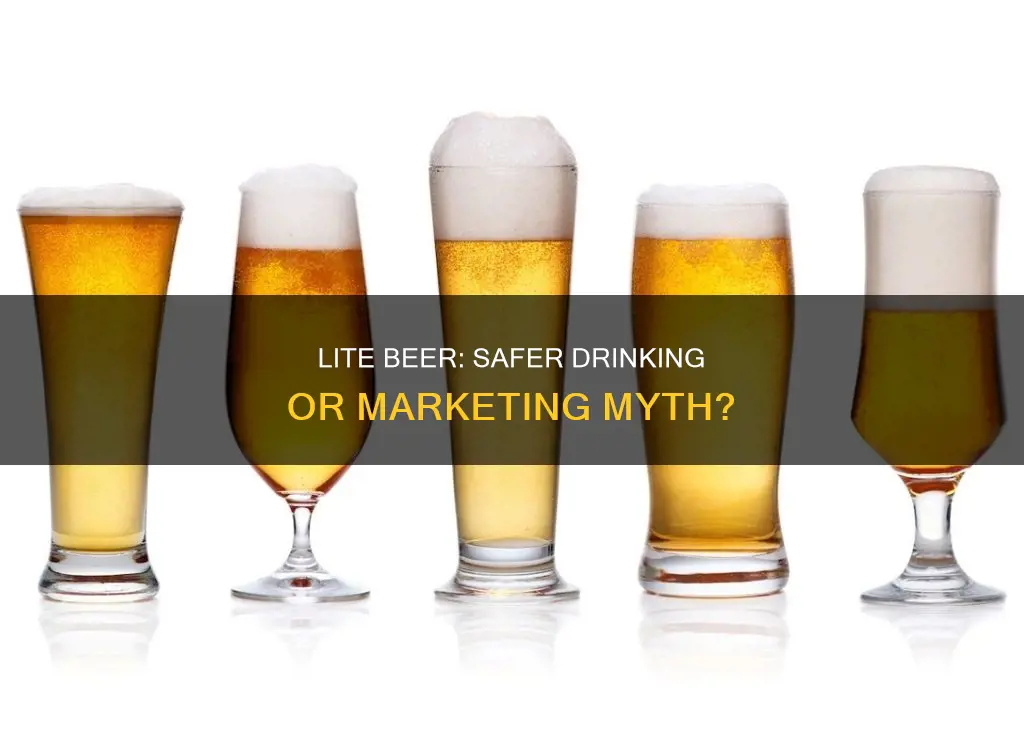
Lite beer is a popular type of beer characterised by its low calorie and alcohol content, making it lighter than traditional beers. It typically has fewer calories, carbohydrates, and sugar than regular beers, making it an attractive option for those watching their weight or moderating their alcohol consumption. However, lite beer is often criticised for being less flavourful than full-strength beers, or for tasting watered down. This article will explore the pros and cons of drinking lite beer, including any potential health benefits or risks associated with this type of beverage.
| Characteristics | Values |
|---|---|
| Calories | Lite beer has fewer calories than regular beer |
| Carbohydrates | Lite beer has fewer carbohydrates than regular beer |
| Sugar | Lite beer has less sugar than regular beer |
| Alcohol Content | Lite beer has a lower ABV than regular beer |
| Taste | Lite beer is often criticised for being less flavourful than regular beer |
What You'll Learn
- Lite beer is lower in calories and alcohol content than regular beer
- It may not, however, reduce weight gain as much as you think
- Lite beer may be less flavourful than full-strength beers
- Drinking moderate amounts of beer may have some health benefits, but these don't always apply to lite beers
- Lite beer is usually a pale or golden-coloured lager beer

Lite beer is lower in calories and alcohol content than regular beer
Lite beer is a popular type of beer that has become a staple for many drinkers. It is characterised by its low calorie and alcohol content, making it lighter than traditional beers. Lite beer typically has fewer calories, carbohydrates, and sugar than regular beers, as well as a lower ABV (alcohol by volume). The average light beer has an ABV of 3 to 4%, while the average regular beer has an ABV of 5 to 7%.
The main difference between lite beers and regular beers is the number of calories, carbohydrates, sugar, and alcohol they contain. Lite beers usually have fewer calories, carbohydrates, and sugar than regular beers, and their lower ABV means they are less intoxicating. This makes lite beer an attractive option for those who want to watch their weight or limit their alcohol consumption.
The definition of "lite beer" can vary among brands and countries. In the United States, "lite beer" typically refers to a beer that is reduced in calories and alcohol content compared to regular beers. However, in other countries like Australia, Canada, and Scotland, "lite beer" primarily refers to a beer with a lower alcohol content. For example, in Australia, regular beers have approximately 5% ABV, while lite beers have 2.2-3.2% ABV.
While lite beer can be a good option for those watching their weight or moderating their alcohol intake, it is important to note that it may not be as flavourful as full-strength beers. Additionally, people may end up consuming more lite beer than regular beer since they may not feel as buzzed, which can lead to consuming more calories overall.
Beer and Medication: What's Safe to Mix?
You may want to see also

It may not, however, reduce weight gain as much as you think
Lite beer is often chosen by those who want to watch their weight or limit their alcohol consumption. While lite beer typically has fewer calories, carbohydrates, and sugar than regular beers, drinking the same amount of lite beer as regular beer may not reduce weight gain as much as you'd think.
Firstly, lite beer is lower in calories only when compared to the same brewery's leading variety of regular beer. For example, Bud Light has 103 calories per 12-ounce serving, while Coors Light has 102 calories. This means that switching from a regular beer to a lite beer may not make as much difference as switching to a lite beer from a different brewery.
Secondly, people may end up drinking more lite beer than they would regular beer, as they need to consume more to feel the same buzz. This could mean that they end up consuming more calories than they would have done otherwise.
Thirdly, lite beers are brewed with minimal ingredients, which means they often have little to no nutritional value. In contrast, some regular beers contain protein and potassium.
Finally, alcohol can stop the body from burning fat and can affect sleep quality, which is directly linked to weight gain and muscle loss.
Therefore, while lite beer may contain fewer calories than regular beer, it may not be as effective for weight loss as people might assume.
Beer and Lexapro: What You Need to Know
You may want to see also

Lite beer may be less flavourful than full-strength beers
Lite beer is often criticised for being less flavourful than full-strength beers. By cutting the calories, brewers significantly reduce or eliminate ingredients like hops or yeast, which leads to a loss of flavour.
However, lite beer is not necessarily less flavourful than full-strength beer. There are endless options of 4% (or under) beers loaded with flavour. The differences in recipe and technique when brewing will alter the caloric value of the beer. For example, the addition of adjuncts such as corn or rice to 'crisp' and reduce the malt flavour of the beer, minimal hopping, and the use of lager yeast can all contribute to a less flavourful lite beer.
In the United States, lite beer is primarily chosen by those who want to reduce their calorie intake or alcohol consumption. Lite beer is any beer that has a lower calorie and/or alcohol content than traditional beers. It typically has fewer calories, carbohydrates, and sugar than regular beers, and a lower ABV (alcohol by volume). The average light beer has an ABV of 3 to 4%, while the average regular beer has an ABV of 5 to 7%. Lite beers are also less in IBU than normal beers.
In other countries, such as Australia, Canada, and Scotland, the term 'lite beer' refers primarily to low alcohol content rather than reduced calories. In Australia, regular beers have approximately 5% alcohol by volume, while light beers have 2.2–3.2% alcohol. In Scotland, the term 'light' customarily refers to a beer with less than 3.5% alcohol by volume.
Beer and SEPTA: What You Need to Know
You may want to see also

Drinking moderate amounts of beer may have some health benefits, but these don't always apply to lite beers
Lite beer, sometimes spelled light beer, is a beer that is reduced in alcohol content or calories compared to regular beers. It is usually a pale lager with fewer calories, carbohydrates, and sugar than regular beers. The average light beer has about 100 calories, while a regular beer has about 150 calories. Lite beers also have a lower ABV (alcohol by volume) of around 3-4%, compared to 5.0-7.5% for regular beers.
The main appeal of lite beer is that it allows drinkers to moderate their alcohol consumption or watch their weight. However, it is often criticised for being less flavourful than full-strength beers or tasting watered down. In addition, the health benefits associated with moderate beer consumption, such as antioxidants, are not always present in lite beers. Studies have shown that lagers and dark ales provide more antioxidants than their light or non-alcoholic counterparts.
While lite beer may have fewer calories and a lower ABV, it is important to note that this does not necessarily translate to reduced weight gain or a healthier option. People may end up consuming more lite beer than they would regular beer, assuming they can drink more due to the lower ABV. This can result in consuming more calories overall. Additionally, the reduced alcohol content can lead to drinking more to achieve the same level of intoxication, which may have negative health consequences.
Furthermore, the definition of "lite" or "light" beer can vary among brands and countries. In the United States, the term typically refers to reduced-calorie and reduced-alcohol beers. However, in other countries like Australia, Canada, and Scotland, "light" beer primarily refers to low-alcohol beers, with an alcohol content of 2.2-3.5%.
Beer and Prostate: Enlargement Risk?
You may want to see also

Lite beer is usually a pale or golden-coloured lager beer
The colour of lite beer is indicative of its lager classification. Reduced calorie/reduced alcohol "light beer" is distinct from "light lager", which was a historical term that distinguished pale or golden lagers with a lighter body from traditional amber lagers and other inherently darker beers. Lite beer is typically a pale lager, although there are some variations that may have a golden hue.
The term "lite" in reference to beer is a marketing strategy, a phonetic version of the word "light" that is easier to remember and helps to differentiate one brand from another. The use of slang words in branding can be more impactful and "cooler," as seen with brands like Miller Lite, Bud Light, and Coors Light.
Lite beers are often marketed as being "light" or "refreshing" in taste, which makes them popular with those who don't enjoy the stronger taste of full-strength beer. The ABV of lite beer is typically around 3-4%, while regular beer has an ABV of 5.0-7.5%. Popular lite beer brands include Bud Light, Miller Lite, Coors Light, Heineken Light, Corona Light, and Michelob Ultra.
While lite beer offers a lower-calorie and lower-alcohol alternative, it is important to note that it may not always result in reduced weight gain or healthier drinking habits. People may consume more lite beer than regular beer, assuming they can drink more without feeling the same effects, ultimately leading to the consumption of more calories. Additionally, lite beers are sometimes criticised for being less flavourful than full-strength beers or for tasting watered down.
Beer and Diarrhea: What You Need to Know
You may want to see also
Frequently asked questions
Lite beer is not necessarily safer to drink, but it does have a lower alcohol content and fewer calories than traditional beers.
Lite beer typically has fewer calories, carbohydrates, and sugar than regular beer. It also has a lower ABV (alcohol by volume), usually around 3-4% compared to 5-7.5% for regular beer.
People may choose lite beer to moderate their alcohol consumption or watch their weight. Lite beer is also marketed as being "light" and "refreshing" in taste, which makes it popular with those who don't like the taste of full-strength beer.
Lite beer may have some health benefits due to its lower alcohol and calorie content. However, it is important to note that excessive alcohol consumption, regardless of the type of beverage, can have negative health effects.







